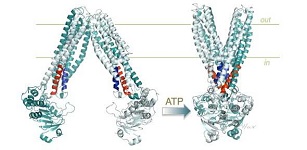 |
| Shape-shifting transport proteins--Courtesy of Henrik van Veen |
Researchers at the U.K.'s University of Cambridge are developing a way to alter DNA in such a way that would allow certain drugs to pass through cell membranes without a hitch.
The team is studying transport proteins, which, embedded in the cell membrane, change shape to prevent some molecules from entering the cell and allow others to go through. And by changing sections of DNA that control these proteins, the scientists hope to form the basis of new treatments for cancer and infections, according to a study in the Journal of Biological Chemistry.
Within every transport protein is a group of four structures, known together as the tetrahelix bundle, which serves as a "spring-lock," changing the shape of the protein to either open the door for the drug or close it. By altering the structure of the tetrahelix bundle, the researchers can allow the uninhibited transport of drugs.
Lead author Henrik van Veen and his team conducted the study using genetically modified bacteria, and the results point to the possibility of personalized medicine by offering genetic solutions to problems in drug delivery.
"To use a metaphor," van Veen told Medical Xpress, "we're working on the development of sticks to put in the spokes to stop these wheels from turning and the use of these sticks in a next generation of anticancer and antimicrobial therapies that will tackle the development of drug resistance."
- here's the Medical Xpress story
- and here's the abstract from the Journal of Biological Chemistry